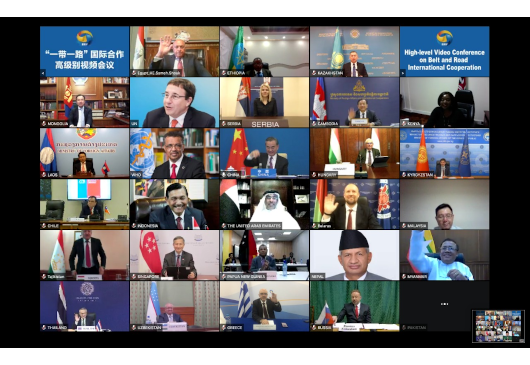 In a videoconference of Belt and Road Initiative (BRI) countries held on Thursday, 18 June, the Deputy Minister of Foreign Affairs for Economic Diplomacy, Kostas Fragogiannis, stressed the great importance of multilateral ties for collective health, prosperity and security on a global level – as shown by the COVID-19 crisis – the need to strengthen international cooperation on a strong and effective World Health Organization (W.H.O.), and the need for cooperation between countries in the context of the Belt and Road Initiative for a comprehensive and coordinated response to the crisis.
In a videoconference of Belt and Road Initiative (BRI) countries held on Thursday, 18 June, the Deputy Minister of Foreign Affairs for Economic Diplomacy, Kostas Fragogiannis, stressed the great importance of multilateral ties for collective health, prosperity and security on a global level – as shown by the COVID-19 crisis – the need to strengthen international cooperation on a strong and effective World Health Organization (W.H.O.), and the need for cooperation between countries in the context of the Belt and Road Initiative for a comprehensive and coordinated response to the crisis.
The videoconference was attended by 22 countries – Hungary, Russia, Serbia, Belarus, Kazakhstan, Kyrgyzstan, Mongolia, Uzbekistan, Nepal, Pakistan, Indonesia, Cambodia, Laos, Malaysia, Myanmar, Singapore, Thailand, the United Arab Emirates, Chile, Egypt, Ethiopia and Kenya – and by the Director-General of the World Health Organization, Tedros Ghebreyesus, and the Deputy Secretary-General of the United Nations, Amina Mohammed. The videoconference was chaired by the Chinese Minister of Foreign Affairs, Wang Yi. The agenda focused on international cooperation in response to the COVID-19 pandemic and its repercussions, with emphasis on a) fighting the pandemic, b) promoting connectivity and economic recovery, and c) support and implementation of BRI programs.
In his remarks, Kostas Fragogiannis underscored the need for the international community to respond to the pandemic in a spirit of solidarity, highlighting that the countries participating in the Belt and Road Initiative “need to focus on programs that have to do with health emergencies and that support economic activity and prepare the ground for economic recovery” through “short-term, mid-term and long-term initiatives, bearing in mind the connections between our economies and the need to maintain trust and stability.”
Referring to the W.H.O., the Deputy Minister of Foreign Affairs pointed to its decisive role in coordinating the global effort against the pandemic, expressing the view that the organization must be supported “in leading the global public health response and the efforts of the wider UN system” in order to be made even more effective in the event of another crisis. “We all have a leading role in a sustainable multilateralism,” he clarified.
In this context, Mr. Fragogiannis referred to Greece and the unprecedented measures it took to stop the spread of the pandemic, protect public health and strengthen our National Health System, thanking China for the assistance it gave our country. “Today,” he said, “we can say with certainty that the measures taken have proved successful in limiting the pandemic. Now the focus is two-fold in Greece: responding to the socio-economic impact of the crisis and returning to full economic activity as soon as possible, with special emphasis on tourism. At this point, he explained that “after successfully limiting the spread of COVID-19 in Greece, our approach is composed of specific rules and health protocols for the safe operation of tourism enterprises and the safety of employees and visitors.
Finally, Mr. Fragogiannis clarified that coordinated and resilient policies during the pandemic are of vital importance for protecting the global system in terms of the health of citizens and the impact on the economy. He stressed that “on a global level, humanity needs joint efforts and solidarity to respond to challenges on this scale,” highlighting that “we all have to continue to participate continuously in a productive and unbiased dialogue, exchanging our experiences with and views on jumpstarting our economies for the benefit of both sides and, in the end, for the benefit of the global economy.”
June 18, 2020


